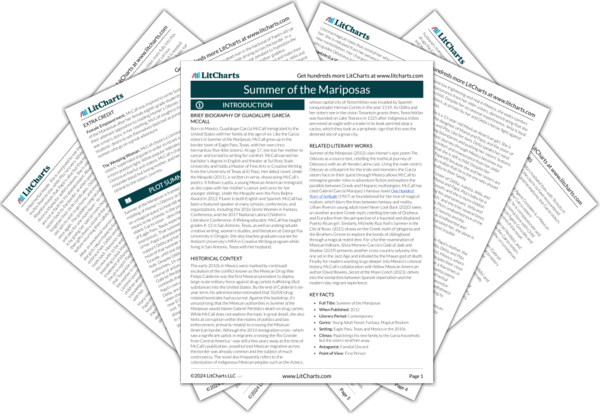When she first appears to Odilia, La Llorona encourages her and her sisters to “remain pure of heart” on their journey and to show kindness and mercy to those they encounter. This directive enhances the fairytale atmosphere of the novel, as folktales designed to be told to children often feature morality lessons in which bad behavior leads to negative consequences. Though the sisters’ intentions are noble, they make mistakes throughout their journey—most notably insulting the sorceress Cecilia, who sends her evil children after them as revenge. While under attack from the lechuzas, the witch owls scream at the girls in the voices of Mamá and others, detailing their wicked sins. In a sense, then, the girls are fighting against the results of their own lack of consideration for others.
Later, after realizing how poorly they have treated Mamá, Delia speculates that Papá left because he was sick of their naughtiness. But Odilia pushes back against this idea, and Abuelita agrees: adults “don’t always do what’s right,” and they cannot blame themselves, even if they have not always been “pure of heart.” This moment calls back to the sisters’ encounter with Chencho, the chupacabras. Although Chencho attacks Pita and Teresita’s husband claims he has no humanity left, Odilia insists they should “grant mercy when it is asked of us,” as La Llorona instructed. Just as she was able to understand that Chencho is only a boy with little control over his urges, Odilia understands that she and her sisters deserve mercy and understanding from their parents. By promoting nuanced mercy and understanding, the novel adapts the black-and-white morality typical to fairytales and suggests that intention and willingness to change—as opposed to perfection—are the main indicators of a pure heart.
Kindness, Mercy, and Morality ThemeTracker

Kindness, Mercy, and Morality Quotes in Summer of the Mariposas
“Don’t you see? There’s a reason we found him instead of the border patrol. He came looking for us because he knew we could help him. It’s not a coincidence that he’s from the same place as Papá.”
“What are you talking about?” I asked. “You’re not making any sense.”
Juanita continued passionately. “Don’t you get it? We were meant to find him, so we could go see our abuelita in Mexico again. It was fate that brought him to us.”
“You were chosen for the goodness in your heart,” she explained. […] “Your sister was right when she said finding the body of the drowned man was not an accident.”
She took my hand once again, her touch still deathly cold. Standing beside the hackberry shrubs with hundreds of empty desiccated cocoons still clinging to their branches and a carpet of butterfly corpses under her feet, La Llorona did not look anything like a malevolent specter. She looked more like a tired, heavily burdened woman.
As apprehension spread into every pore of my being, I did the one thing I could to quiet the guilt in my mind. I turned the radio on. But even with the sound of loud music reverberating through the car, I could still hear my conscience nagging at me. You could have stopped this, all of it, it whispered. This is more your fault than anyone else’s. You’re the eldest. You should have known better.
“What Cecilia has beset upon you is just the beginning. You must save the ear pendant’s remaining gifts. Use them sensibly, for there is so much more to life than nightmares and demons in the dark. In order to go home, to be truly happy again, you must face the worst enemy of all, the monster that lives among you.”
With two lechuzas at their backs, they busted out of the barn as if their heels were on fire, never once looking back. Had they abandoned their hermanitas?
I looked at the barn doors noisily slapping back and forth with the force of the storm, and I couldn’t help but feel powerless. The twins’ desertion shattered any hope I had left of defeating the malevolent witches. And for the first time on our journey, I wanted to cry.
“Odilia is right. We’re the Garza girls, cinco hermanitas, five little sisters under the protection of the goddess,” she said, holding the stake in front of her with both hands and anchoring the sharp point of it on the ground.
“That’s right,” I said. I looked down at Pita, who was clutching her ankle, wincing. “Remember what I told you? La Llorona said we must remain noble and kind. We should grant mercy when it is asked of us.”
“You mean he doesn’t love us anymore?” Pita asked.
“Would you? If you had us for daughters?” Delia asked Pita, looking at her sisters resentfully.
That’s when I realized the evil of what the lechuzas said about us. We had been bad, yes, but was what Papá did our fault? “Yes, I would still love us,” I said, angry with myself for not realizing the twins had been blaming themselves for Papá’s absence all this time. “The way I see it, we didn’t fail Papá, he failed us. He’s the adult here.”
“You have done well, my daughter. Your migration through the voyage of pain and sorrow has been hard, but you are at the end of your journey. The Ancients have waited a long time for you to emerge, to spread your wings, to take flight. And now, they are ready for you to come home.”











